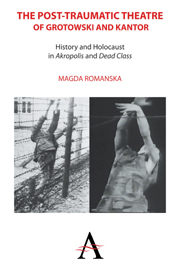 The Post-traumatic Theatre of Grotowski and Kantor
The Post-traumatic Theatre of Grotowski and Kantor Book contents
- Frontmatter
- Contents
- Foreword by Kathleen Cioffi
- Preface
- Acknowledgments
- List of Illustrations
- Introduction
- Part I Our Auschwitz: Grotowski's Akropolis
- Part II Our Memory: Kantor's Dead Class
- Chapter 22 Tadeusz Kantor: A Very Short Introduction
- Chapter 23 Dead Class: The Making of the Legend
- Chapter 24 Dead Class in Poland
- Chapter 25 The Polish History Lesson
- Chapter 26 Dead Class Abroad
- Chapter 27 On Not Knowing Polish, Again
- Chapter 28 The Visual and the Puerile
- Chapter 29 The National and the Transnational
- Chapter 30 Witkiewicz's Tumor
- Chapter 31 An Age of Genius: Bruno Schulz and the Return to Childhood
- Chapter 32 Conversing with Gombrowicz: The Dead, the Funny, the Sacred and the Profane
- Chapter 33 Panirony: “A pain with a smile and a shrug”
- Chapter 34 Raising the Dead
- Chapter 35 Dead Class as Kaddish…
- Chapter 36 Dead Class as Dybbuk, or the Absence
- Chapter 37 The Dead and the Marionettes
- Chapter 38 Men and Objects
- Chapter 39 Dead Class as Forefathers' Eve
- Chapter 40 Dead Class: The Afterlife
- Postscript
- Appendix
- Notes
- Bibliography
- Index
Chapter 29 - The National and the Transnational
from Part II - Our Memory: Kantor's Dead Class
- Frontmatter
- Contents
- Foreword by Kathleen Cioffi
- Preface
- Acknowledgments
- List of Illustrations
- Introduction
- Part I Our Auschwitz: Grotowski's Akropolis
- Part II Our Memory: Kantor's Dead Class
- Chapter 22 Tadeusz Kantor: A Very Short Introduction
- Chapter 23 Dead Class: The Making of the Legend
- Chapter 24 Dead Class in Poland
- Chapter 25 The Polish History Lesson
- Chapter 26 Dead Class Abroad
- Chapter 27 On Not Knowing Polish, Again
- Chapter 28 The Visual and the Puerile
- Chapter 29 The National and the Transnational
- Chapter 30 Witkiewicz's Tumor
- Chapter 31 An Age of Genius: Bruno Schulz and the Return to Childhood
- Chapter 32 Conversing with Gombrowicz: The Dead, the Funny, the Sacred and the Profane
- Chapter 33 Panirony: “A pain with a smile and a shrug”
- Chapter 34 Raising the Dead
- Chapter 35 Dead Class as Kaddish…
- Chapter 36 Dead Class as Dybbuk, or the Absence
- Chapter 37 The Dead and the Marionettes
- Chapter 38 Men and Objects
- Chapter 39 Dead Class as Forefathers' Eve
- Chapter 40 Dead Class: The Afterlife
- Postscript
- Appendix
- Notes
- Bibliography
- Index
Summary
Dead Class was successfully performed all over the world. In each new city, as Klaudiusz Święcicki put it, “Every viewer came to the spectacle with his or her own cultural system of significations. Hence the many interpretations of this work.” Since neither language nor historical context was available to international audiences, foreign critics used other strategies to structure their responses to Kantor's elusive masterpiece. Reading those initial reviews is important because they provide a framework for the process of making meaning, the entire epistemological enterprise that eventually came to surround Kantor's work. The foreign critical response to Kantor's work reflects the innate difficulty of finding a critical framework to address its meaning. Critics’ inability to grasp its geographic, historical, artistic or aesthetic meanings underscores the difficulty with which works like Dead Class are classified, taught and shown. Many foreign critics argued that Kantor's work is intrinsically transnational, even though it clearly bears the marks of its Polish origins. As early as 1977, Raymonde Temkine wrote of Dead Class that although “the performance has a trans-national meaning, one can feel an exceptionally strong sense of Polishness running through it.” Jean-Pierre Leonardini suggested: “To argue that The Dead Class is performed in an exclusively Polish cultural context is misguided.” Nella Bielski saw it in the context of European postmodernism.
- Type
- Chapter
- Information
- The Post-traumatic Theatre of Grotowski and KantorHistory and Holocaust in 'Akropolis' and 'Dead Class', pp. 212 - 214Publisher: Anthem PressPrint publication year: 2012


